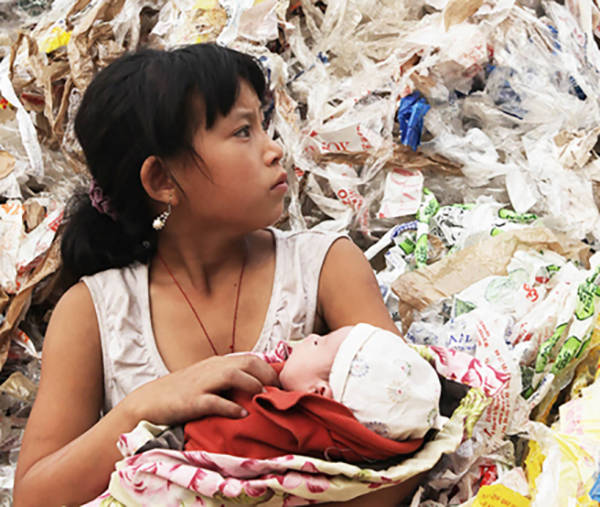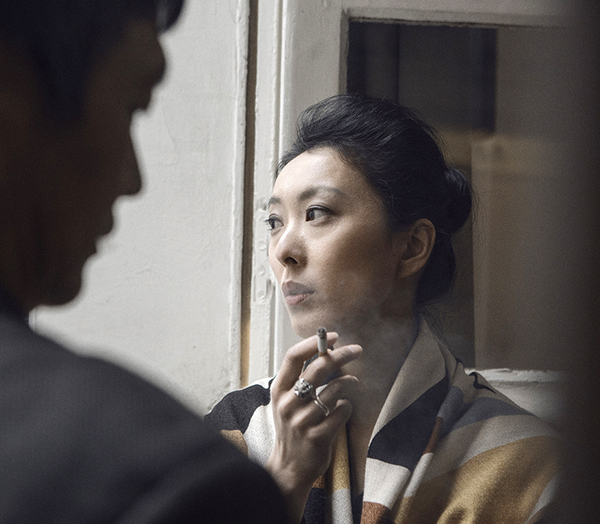
Film Review

By Joe Bendel
CNEX

In the documentary “Plastic China,” we meet 10-years-old Yi-jie, who, rather than being in school, spends her days helping her mother tend her siblings or sifting through garbage.
ommomim.
The hollow words of Chairman Mao constantly echo throughout the film.
In the documentary “Plastic China,” 10-year-old heroine Yi-jie’s dearest wish is to attend school. But as a member of China’s Yi people, one of its oldest ethnic minorities, and one that has been left far behind in terms of education and economic success, she likely will not get that chance. Even for the Han people, the ethnic majority, educating a child can be unduly expensive. Tuition itself is low, but the arbitrary additional fees add up. Going over the water quota while washing up incurs an extra charge; taking a nap costs 1 yuan per day, or 2.5 if the student uses a bed (ept.ms/EduChina). The World Bank estimates that Chinese parents are spending the equivalent of between five and 10 years’ worth of annual income on each child’s education—something impossible for the poor.
‘Plastic China’
Documentary
Director
Wang Jiu-liang
Running Time
1 hour, 26 minutes
Release date
Jan. 21
★★★☆☆
By Joe Bendel Rel,, Independent films give us entry in N, 51(15 we cot hardly iimigine olherw especia \\ hen I lie A‘o regaled are so cult urall politically different Iron own. "I his xveel: the fill revim ed. at the Sunda Film Festival. cumin lilt in communisl China.
In China, they recycle plastic, but throw away lives.
China is the leading importer of plastic waste from the West, but education is a luxury, dependent on factors like family income and geography. The savage inequalities of contemporary China are inescapably evident in the lives of the workers at a Shandong recycling plant, whose routines and travails are captured in Wang Jiu-liang’s documentary “Plastic China,” which screened at the 2017 Sundance Film Festival.
What you discard might end up in Kun’s struggling recycling plant. The owner labors like a mule, but his employee Peng mostly comes across like a lazy drunk. Frankly, Peng’s 10-year-old daughter, Yi-jie, has a much greater work ethic. She seems to have assumed most of the family's child care duties to relieve her constantly pregnant mother, but also does her share of plastic sorting.
Both Kun and the audience can plainly see the responsible-beyond-her-years Yi-jie should be in school, but the useless Peng spends most of the family’s money on drink. Obviously, the idea of simply enrolling her in public school is completely foreign in this province. It would cost Peng a considerable tuition fee under the best of circumstances, but the fact they are ethnic Yi from Sichuan Province, without proper residency permits, presents further complications.
Wang’s previous documentary was the environmental horror show “Beijing Besieged by Waste,” so it would seem he has a perverse affinity for dumps and waste-processing facilities.
However, “Plastic” is very much focused on its human subjects. Yi-jie quickly emerges as Wang’s focus, and viewers will earnestly root for her. She is a hardworking, sensitive kid who deserves a future, but it is not clear whether she will have one. While Wang’s approach is strictly observational, he clearly takes sides in the recycling plant's conflicts. Of course, it is difficult to fault him for aligning with youthful innocence and virtue.
AMA PDODUCTIONS

In the film “Tearing Us Apart,” Shen Dai (Nai An) has been raised by adoptive parents in France but still bears resentment toward her birth parents in China.
could I (I k• all■ (►r 0111 our 'dance In Ili. By Joe Bendel
If Shen Dai had remained in China, there is no way an Isabelle Huppert-like film star ever would have been part of her social circle. In this case, it is probably safe to say that "Isabelle" is based on Huppert, since she is played by the screen legend herself. That bit of casting' was quite a coup for Hu Wei's latest short film, but it never overshadows the complicated emotions at the center of “What Tears Us Apart,” which screened as part of Shorts Program 1 during the 2017 Sundance Film Festival.
There are indeed social-political implications to Shen Dai’s story that viewers might guess (especially if they are cognizant of the Chinese Communist Party's strict family planning policies), but they still ought to let Hu reveal everything in his own due time.
Initially, we are not sure why an older Chinese couple is visiting Isabelle and her gracious, slightly older husband Benoît-nor perhaps are they.
Eventually, we figure out they are really there to see Shen Dai and her daughter, but Shen Dai prefers to have Isabelle and Benoit present to run interference. However, when the three finally sit down just by themselves, the older woman's emotions come gushing out uncontrollably.
Clearly, Shen Dai's life in France has thus far been more comfortable than it would have been had she remained in China. Yet, we get a visceral sense of her lingering pain and resentment.
As always, I Iuppert is a force to be reckoned with, but you will be hard pressed to see a more haunting performance than Nai An’s devastating portrayal of Shen Dai, in any film of any length.
Although more active as a producer, Nai An also gave a remarkably sensitive and powerful lead performance in Ying Liang's “When Night Falls,” a film of such bold integrity that it caused the filmmaker to be declared persona non grata in his homeland of mainland China.
As an added bonus, veteran French character acsor Andre Wilms elf Hanel niicdy 11111111111111Moi
We get a visceral sense of Shen Dai's lingering pain and resentment.
Hu Wei’s short film “What Tears Us Apart,” set in France, explores the ramifications of China’s restrictive birth policies on families. Since 1979, China’s one-child policy has required women to obtain a permit to have a first child, and since 2016, a second, or be subject to a forced abortion. According to the State Department’s Country Reports on Human Rights Practices for 2015, the number of abortions yearly in China is about 23 million, or more than 60,000 abortions a day (ept.ms/23million).
Since the Chinese have a traditional preference for sons, some parents may decide to voluntarily abort their girls. But one field researcher believes, with a fair degree of certainly, that most abortions are forced (ept.ms/forcedstats).
Even with the recent law allowing for a second child, not all families qualify. In these cases, those who can afford it may leave China to bear a second child and upon retuning pay as much as S36,000 in fines teams/
‘What Tears Us Apart’
Director
Hu Wei
Starring
Nai An, Isabelle
Huppert, André Wilms
Running Time
18 minutes
Release date
Jan. 20
★★★☆☆